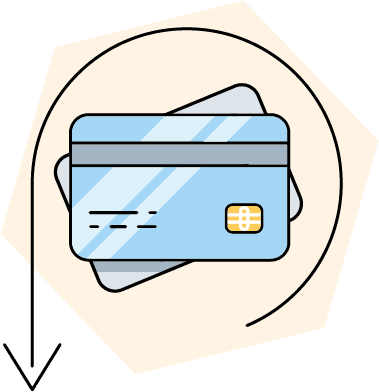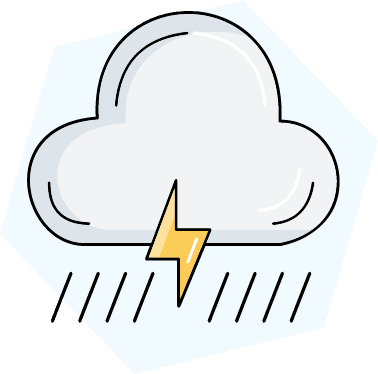Typical homeowners’ claims concern property damage from wind and hail, water damage and freezing, and fire and lighting. But policies can also surprise homeowners and renters by covering less frequent occurrences, such as spoiled food after a power outage or fire caused by a volcanic lava flow.
Your policy may already include some of these coverages, while others may need to be added. Learn more about how these more unusual coverages work.
Table of Contents
Food Spoilage Due to Power Outages

When your power goes out, your refrigerator and freezer contents can thaw and spoil, generally after about 24 hours. After reaching room temperature, the food is no longer safe to eat. Many homeowners’ insurance policies compensate for spoiled food if the power outage is due to an insured peril, such as a winter storm or downed tree.
Your homeowners’ policy will state the compensation limit, such as $500 or $1,000. Your policy may also include other requirements, such as ensuring you are not at fault for the power outage.
As with any other claim, you must submit documentation to ensure your claim is covered. This might include dates, photos, documentation of food losses, estimated costs, and any receipts you have for the ruined food.
Coverage for Grave Markers

Many homeowners’ policies extend coverage beyond the home, paying for damages to burial property such as grave markers, urns, and mausoleums. If your policy does not already cover grave markers, you may be able to buy a rider to add that coverage.
Coverage for grave markers will generally pay for damage due to a covered peril, such as theft, vandalism, or severe weather. If grave marker coverage is available through your regular homeowners’ policy, it will likely be subject to special limits. The policy will outline a limit on your policy declarations page, often with a limit of $1,000 to $5,000.
Unauthorized Credit Card Use

Many home insurance policies may cover losses incurred when someone steals your credit card and uses it fraudulently. A thief can run up thousands of dollars in expenses, particularly if you do not notice your card is missing right away.
Homeowners’ insurance coverage will reimburse you up to a specified amount, such as $1,000. This coverage usually excludes unauthorized use by other household residents. For example, the loss may not be covered if your child uses your credit card without authorization.
But before making a claim, report the card’s theft to your credit card company. Your card company may already cover unauthorized use charges without the need to file a claim. Handling it with your credit card company is preferable if that is an option because filing a home insurance claim could potentially raise your rates later.
Falling Objects from the Sky

Damage caused by falling objects is routinely covered by homeowners’ and renters’ policies, similar to other damage-causing perils such as fire or windstorms. Falling objects might include asteroids, meteorites, airplane parts, satellites, and other space debris.
As with most homeowner policies, you’ll likely find exclusions. For example, property damage inside your house may not be covered unless the falling object also damages your roof or exterior wall. Also, the coverage will not pay for damage to the falling object itself.
Volcanic Eruption

A volcanic eruption can damage your house in many ways, including the force and ground movement of the initial blast, falling ash, and lava flow. Each company’s policy differs, so homeowners at risk of volcanic eruption, ash, and lava flow should review their policy’s coverage with their insurer. For example, if super-heated lava flow causes a fire, your home or structure damages may be covered under your existing fire peril.
Sometimes, you may need special coverage through your state, such as the Hawaii Property Insurance Association (HPIA). If you live in a high-risk lava zone, coverage might cost more.
Damage from Sonic Booms

Aircrafts traveling faster than the speed of sound can cause sonic booms due to changes in air pressure. A sonic boom is a loud, thunder-like sound vibration that can damage your home’s windows and siding. Military jets sometimes cause sonic booms.
Your policy may cover damage from sonic booms if it’s not explicitly excluded or if it’s considered damage caused by aircraft. Alternatively, if a sonic boom damages your property, you might approach the military base responsible to discuss repairs and reimbursement. This may require filing form “SF-95: Claim for Damage, Injury, or Death.”
You can also speak with your homeowner’s policy carrier to ask which approach is best if you’re facing an urgent situation, such as one or multiple broken windows.
The Importance of Knowing Your Policy
Read your current policy thoroughly. Contact your insurance agent to discuss any aspects of your policy you find confusing, unusual, or unexpected.
Also, consider whether any exclusions or inclusions make sense for your situation. For example, if you live next to an active volcano or have frequent power losses, ensure you understand what is or is not covered by your homeowners’ policy and any associated deductibles.
Ask your agent to describe situations where your policy may not cover your damages. Consider whether your savings account could withstand the shock of an unexpected expense. You may need to add coverage through your current insurer or shop for a new plan that provides more security.
